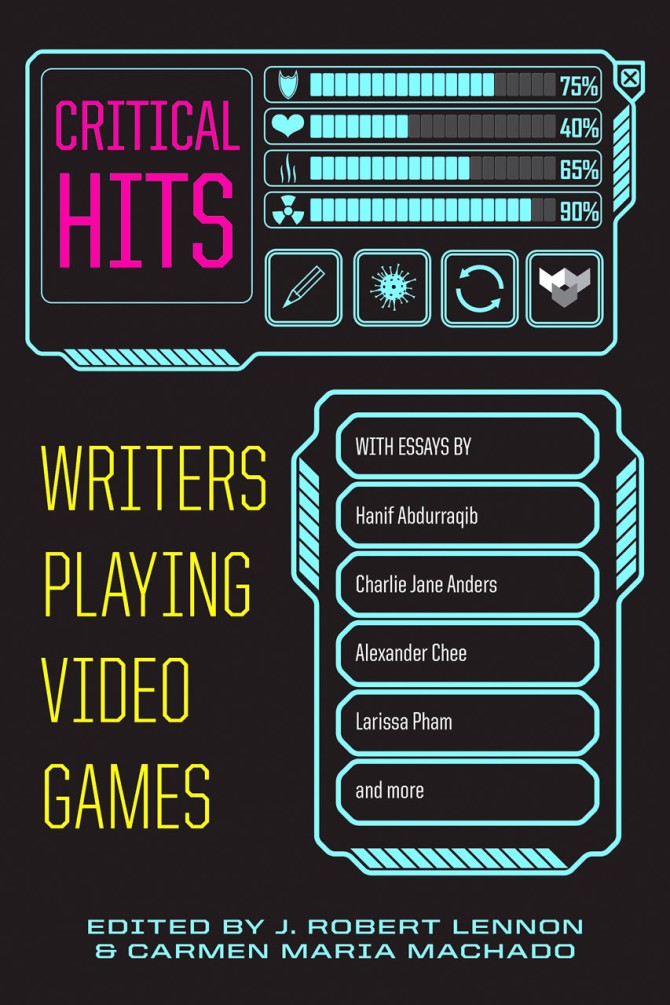From pages to pixels: Writers offer literary take on video games
By David Nutt, Cornell Chronicle
The stereotypical image of a writer usually involves some poor tortured soul hunched over a notebook or keyboard, wrestling with weighty themes of humanity and grammar, or at least gazing wistfully out a window while procrastinating.
But maybe, according to J. Robert Lennon, the Ann S. Bowers Professor of English in the College of Arts and Sciences, writers are just as likely to be hunkered in front of a computer or TV screen, blasting aliens and zombies or building virtual yurts.
In “Critical Hits: Writers Playing Video Games,” a new essay anthology Lennon co-edited with Carmen Maria Machado, published this month by Graywolf Press, a group of contemporary authors, including Alexander Chee, Hanif Abdurraqib, Eleanor Henderson and Elissa Washuta, explore their own experiences with gaming, and how those simulated worlds connect to real life.
Lennon spoke with the Chronicle about the book.
Question: Video games are immensely popular, yet they rarely receive much attention from the literary world. Why do you think that is?
Answer: For a lot of people my age and a little younger, the games of our childhood were fun, but not especially sophisticated. These days they’re larger and more complex, and the range of subjects and emotions they’re capable of addressing has grown tremendously; for many of us, they’re now a parallel art form, with as much expressive potential as fiction or poetry, film or theater. Editing this book made us realize how much pent-up interest there was in the subject.
Q: The essays in this collection touch on everything from grief and depression, to race and gender, to salvation and Christmas shopping. Your own essay juxtaposes the joys of virtual homesteading with the bewilderment of pandemic life. What was the most surprising thing you found in assembling and co-editing the book?
A: I assumed only a fraction of the people we solicited would have something good. Instead, it felt like every writer we liked was just sitting there, waiting to be asked. I was also worried there would be a sameness to the essays, that people would position themselves too similarly to the medium, but that wasn’t the case at all; the essays are truly diverse in approach and style. Getting that first round of submissions was a thrill.
Q: What has been your history with video games? What was the first game you ever played and what do you remember about it?
A: Probably Zork, the 1977 text adventure that reached home computers in the early ’80s. I would have gotten an Atari 2600 around then, too, and was obsessed with Adventure, where you play the role of a featureless square exploring a castle. These were primitive games but they had real style! Adventure is often credited with containing the first “easter egg,” that is, a secret message from the developer; you could access it by holding a particular object while passing through a wall. I found it at random; I don’t think I’ve ever been more excited. Maybe this ignited my love for secrets and mysteries in literature, who knows.
Q: You’ve often employed an experimental approach to writing fiction, i.e., surreal conceits, mistranslations, exploring different genres and forms. Is there a similarity or correlation, perhaps, between the “play” in your writing process and playing video games?
A: Yes, absolutely. I love a constraint to spark creative inspiration, and a good game invites you to bump up against the boundaries of its world. I often tell students that the things I’ve written that people seem to like are the ones made in a spirit of play. When we take the pressure off ourselves, sometimes we’re freed to do something different, something truly original.
Q: As video games evolve and become ever more immersive, with sophisticated narratives and better graphics, do you think they pose a risk to quaint, old-timey art forms such as…books? Is “Critical Hits” giving comfort and encouragement to one of literature’s greatest existential threats? (Asking for a friend.)
A: Ha! Who knows, maybe? Perhaps, in the distant future, our discipline will exist solely via lore drops in Elder Scrolls IX. But the ship bearing literature’s cultural dominance sailed a long time ago, and the medium has nevertheless continued to thrive, at least artistically. Personally, I’d rather ply a niche art than a popular one; you can get away with anything. Thank goodness I don’t publish a book and immediately get a thousand angry emails telling me the skill tree blows and the shotguns aren’t powerful enough. Relative obscurity is a blessing!
Media Contact
Abby Kozlowski
Get Cornell news delivered right to your inbox.
Subscribe

